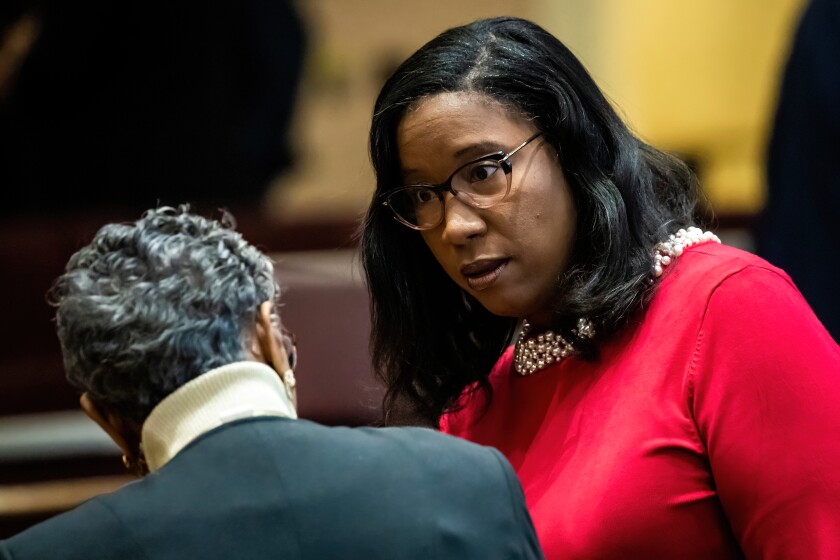Politics
City Treasurer Announces Boycott of U.S. Treasury Bonds

City Treasurer Melissa Conyears-Ervin ignited a political controversy on Wednesday by announcing her office’s decision to cease investments in U.S. Treasury bonds. Conyears-Ervin described this move as a protest against what she termed the “authoritarian regime” of President Donald Trump.
At a hearing focused on Mayor Brandon Johnson‘s proposed budget for 2026, Conyears-Ervin stated, “Chicagoans do not want us to bankroll the regime — the authoritarian regime — of Donald Trump where he has waged a war on our city.” Her office manages a $10 billion portfolio, and over the past three years, it has held more than $200 million in U.S. Treasury securities.
Beginning immediately, Conyears-Ervin directed her staff to boycott the purchase of these securities. This announcement has drawn significant criticism from various members of the Chicago City Council.
Alderman Ray Lopez of the 15th Ward expressed disbelief at Conyears-Ervin’s unilateral decision. “Did you just say that you were going to disinvest from the United States?… Are we not an American city?” Lopez asked during the hearing. He emphasized the oath taken by council members to support the United States Constitution and questioned the implications of such a decision for Chicago.
In response, Conyears-Ervin asserted, “It’s a bold statement, isn’t it? And we need it to be.” Lopez countered, labeling her statement as “dangerous and reckless,” arguing that her primary responsibility should be managing investments that yield financial returns for taxpayers.
While acknowledging that U.S. Treasury bonds have traditionally provided strong returns, Conyears-Ervin asserted that alternative investments are equally viable. “There are many instruments that produce a rate of return,” she said, indicating that the city would explore options such as corporate bonds and asset-backed securities that maintain safety and liquidity.
The reaction from the council continued, with Alderman Anthony Napolitano of the 41st Ward expressing his frustration. He stated he was compelled to leave the Council chambers to calm down after hearing Conyears-Ervin’s remarks. “You came in here on a [political] campaign instead of a budget report,” he said, arguing that such a statement should not represent the views of the entire city.
Alderman Nick Sposato of the 38th Ward expressed disappointment rather than anger. A supporter of Trump, Sposato remarked, “We’re not at war with the president of our country,” emphasizing the need for unity rather than division within the city.
Alderman Bill Conway, a former investment banker, pointed out the historical security of U.S. Treasury bonds. He suggested that Conyears-Ervin reconsider her decision, stating, “It is a pretty well-known axiom that the United States Treasury is by far the most liquid and secure debt instrument in the history of the world.”
This development raises questions about the political implications of financial decisions made by elected officials and their potential impact on municipal investments. As Chicago navigates its financial strategies, the debate over the role of political beliefs in financial governance is likely to continue.
-

 Top Stories1 month ago
Top Stories1 month agoRachel Campos-Duffy Exits FOX Noticias; Andrea Linares Steps In
-

 Top Stories2 weeks ago
Top Stories2 weeks agoPiper Rockelle Shatters Record with $2.3M First Day on OnlyFans
-

 Entertainment5 hours ago
Entertainment5 hours agoJayda Cheaves Claims Lil Baby and Ari Fletcher Had an Affair
-

 Top Stories2 weeks ago
Top Stories2 weeks agoMeta’s 2026 AI Policy Sparks Outrage Over Privacy Concerns
-

 Sports2 weeks ago
Sports2 weeks agoLeon Goretzka Considers Barcelona Move as Transfer Window Approaches
-

 Top Stories2 weeks ago
Top Stories2 weeks agoUrgent Update: Denver Fire Forces Mass Evacuations, 100+ Firefighters Battling Blaze
-

 Health2 months ago
Health2 months agoTerry Bradshaw Updates Fans on Health After Absence from FOX NFL Sunday
-

 Sports1 week ago
Sports1 week agoSouth Carolina Faces Arkansas in Key Women’s Basketball Clash
-

 Top Stories2 weeks ago
Top Stories2 weeks agoOnlyFans Creator Lily Phillips Reconnects with Faith in Rebaptism
-

 Top Stories1 week ago
Top Stories1 week agoCBS Officially Renames Yellowstone Spin-off to Marshals
-

 Top Stories2 weeks ago
Top Stories2 weeks agoOregon Pilot and Three Niece Die in Arizona Helicopter Crash
-

 Entertainment2 weeks ago
Entertainment2 weeks agoTom Brady Signals Disinterest in Alix Earle Over Privacy Concerns
